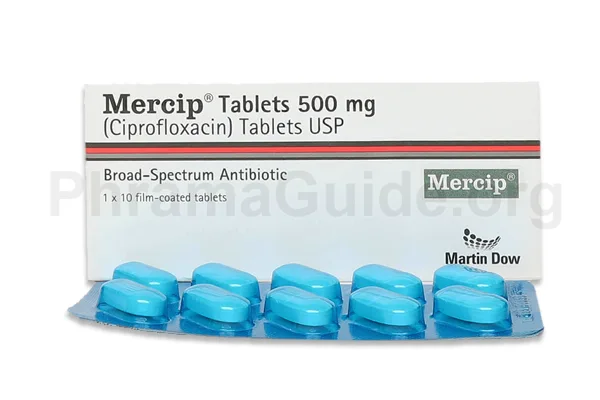Mercip tablet is a broad-spectrum antibiotic that is used to treat a variety of bacterial infections. It belongs to a class of antibiotics known as fluoroquinolones. Following are some common uses of Mercip Tablet:
- Urinary Tract Infections (UTIs): Mercip is often used to treat uncomplicated and complicated UTIs caused by susceptible bacteria, including Escherichia coli (E. coli), Klebsiella pneumoniae, and other organisms.
- Respiratory Tract Infections: Mercip may be used to treat respiratory tract infections such as bronchitis, pneumonia, and exacerbations of chronic obstructive pulmonary disease (COPD) caused by susceptible bacteria.
- Skin and Soft Tissue Infections: Mercip is effective against various skin and soft tissue infections, including cellulitis, abscesses, wound infections, and certain types of infected ulcers.
- Gastrointestinal Infections: Mercip may be used to treat gastrointestinal infections caused by susceptible bacteria, including certain types of infectious diarrhea.
- Bone and Joint Infections: In some cases, Mercip may be used to treat bone and joint infections, including osteomyelitis and septic arthritis, caused by susceptible bacteria.
- Sexually Transmitted Infections (STIs): Mercip can be used to treat certain sexually transmitted infections, such as gonorrhea, in cases where the bacteria are known or suspected to be susceptible to the drug.
- Anthrax Prophylaxis and Treatment: Mercip is one of the antibiotics used in the treatment and prevention of anthrax, a serious bacterial infection caused by Bacillus anthracis.
Off-label Uses of Mercip Tablet
- Prostatitis: Mercip may be used off-label for the treatment of bacterial prostatitis, which is an inflammation of the prostate gland caused by a bacterial infection.
- Sinusitis: In certain cases, Mercip may be used off-label for the treatment of bacterial sinusitis, particularly when other antibiotics have failed or are not appropriate.
- Eye Infections: Mercip eye drops or ointment may be used off-label to treat certain bacterial eye infections, such as conjunctivitis or corneal ulcers.
- Cholera: Mercip can be used off-label as part of the treatment regimen for cholera, a severe diarrheal disease caused by the bacterium Vibrio cholera.
- Tuberculosis (TB): In some situations, Mercip may be used off-label as part of combination therapy for the treatment of drug-resistant tuberculosis (TB). However, its use in TB treatment is generally limited and dependent on specific factors.

What is Mercip?
Mercip is one of the leading brands of Ciprofloxacin, manufactured and marketed by Matin Dow Marker, Pakistan.
Mercip Alternatives : Other Similar Brands
The following are some available alternative brands of Mercip and their manufacturers.
- Novidat : Sami Pharmaceuticals (Pvt) Ltd, Pakistan.
- Ciproxin : Bayer Schering Pharma.
- Ciplet : Indus Pharma (Pvt) Ltd, Pakistan.
- Lucid : Saffron Pharmaceuticals (Pvt) Ltd, Pakistan.
- Cipesta : Getz Pharmaceuticals (Pvt) Ltd, Pakistan.
- Hiflox : Hilton Pharmaceuticals (Pvt) Ltd, Pakistan.
- Mytil : Wilsons Pharmaceuticals (Pvt) Ltd, Pakistan.
- Hipro : Helix Pharma (Pvt) Ltd, Pakistan.
- Ciproquine : Macter International.
- Algocin : AGP Pharma, Pakistan.
- Cycin : High Q Pharmaceuticals (Pvt) Ltd, Pakistan.
Mercip : Available Formulations and Strengths
Presently, Mercip is available in Tablet and Infusion Forms with the following strengths.
Mercip Tablet : 250mg and 500mg strength.
Mercip Infusion : 200mg/100ml strength.
Who Should Not Use Mercip?
Mercip has certain contraindications, which are situations or conditions in which the use of Mercip is not recommended or should be avoided due to the potential risks involved.
- Hypersensitivity: Mercip is contraindicated in individuals who have a known hypersensitivity or allergy to Mercip or other fluoroquinolone antibiotics. Allergic reactions to Mercip can range from mild skin rashes to severe reactions, including anaphylaxis.
- Tendon Disorders: Mercip is contraindicated in individuals with a history of tendon disorders associated with fluoroquinolone use. This includes conditions such as tendonitis (inflammation of tendons) and tendon rupture. Tendon disorders may occur in various parts of the body, including the Achilles tendon.
- Myasthenia Gravis: Mercip is contraindicated in individuals with a history of or current diagnosis of myasthenia gravis, a neuromuscular disorder characterized by muscle weakness and fatigue. Fluoroquinolone antibiotics, including Mercip, may exacerbate muscle weakness in individuals with this condition.
- Severe Liver Disease: Mercip is contraindicated in individuals with severe liver disease, as the clearance and metabolism of the medication may be impaired. Mercip is primarily metabolized in the liver, and liver dysfunction can lead to increased drug levels and potential toxicity.
- Severe Renal Impairment: Mercip is contraindicated in individuals with severe renal impairment (kidney disease) or those on dialysis. In such cases, the clearance of Mercip from the body may be significantly reduced, leading to increased drug levels and an increased risk of adverse effects.
- Pregnancy and Breastfeeding: Mercip is generally contraindicated during pregnancy and breastfeeding. The use of Mercip during pregnancy may pose potential risks to the developing fetus, and the medication can pass into breast milk and potentially harm the nursing infant.
What is the Recommended Daily Dosage of Mercip?
Mercip Dose for Uncomplicated Urinary Tract Infections (UTIs):
- One Tablet of 250mg, twice daily for 3 days.
Mercip Dose for Complicated Urinary Tract Infections and Other Infections:
- One Tablet of 500mg, twice daily.
Mercip Dose for Respiratory Tract Infections:
- One Tablet of 500mg, twice daily.
Mercip Dose for Skin and Soft Tissue Infections:
- One Tablet of 500mg, twice daily.
Mercip Dose for Gastrointestinal Infections:
- One Tablet of 500mg, twice daily for 5-7 days.
How Mercip Works?
Mercip works by targeting the enzyme DNA gyrase (topoisomerase II) in bacteria. DNA gyrase is responsible for unwinding the DNA double helix during replication, transcription, and repair processes. By inhibiting DNA gyrase, Mercip prevents the normal functioning of the enzyme.
In addition to inhibiting DNA gyrase, Mercip also inhibits another bacterial enzyme called topoisomerase IV. This enzyme is involved in the separation of interlinked DNA strands during cell division. By inhibiting topoisomerase IV, Mercip further interferes with DNA replication and induces DNA strand breakage.

Leave A Comment